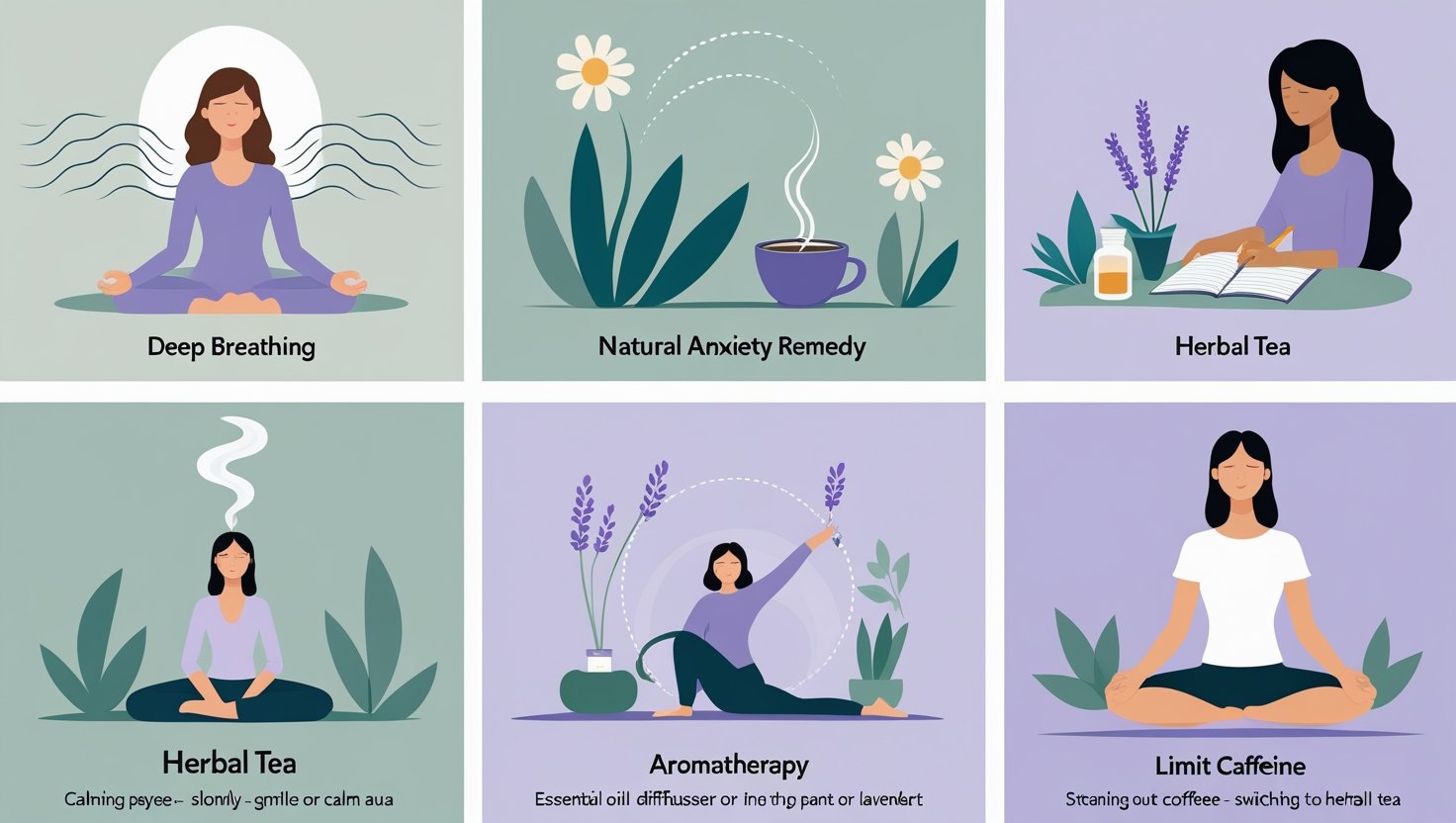Anxiety – Anxiety-related conditions are the most common variety of mental issue and are endured by millions of people across the globe, about 40 million of which are of US adults suffering with an anxiety disorder each year. While traditional treatments such as medication and therapy can be useful, many people are looking to natural remedies to further help manage their anxiety symptoms.
Whether you’re interesting in supplementing your treatment course or you’re just trying to understand what natural options to discuss with your mental health provider, knowing which natural approaches work and which don’t can be a game changer for your mental health journey.
The good news, however, is that there are a handful of natural remedies that have science on their side for helping not only to slow anxiety symptoms — but to truly reduce them. From ancient habits, such as mindfulness and exercise, to herbal products that science shows can lift mood, there are plenty of ways to support mental wellness naturally. That said, not all natural remedies are necessarily worth your time or money — and here are a few popular solutions that might not be as effective as they claim.
1. Talk Therapy
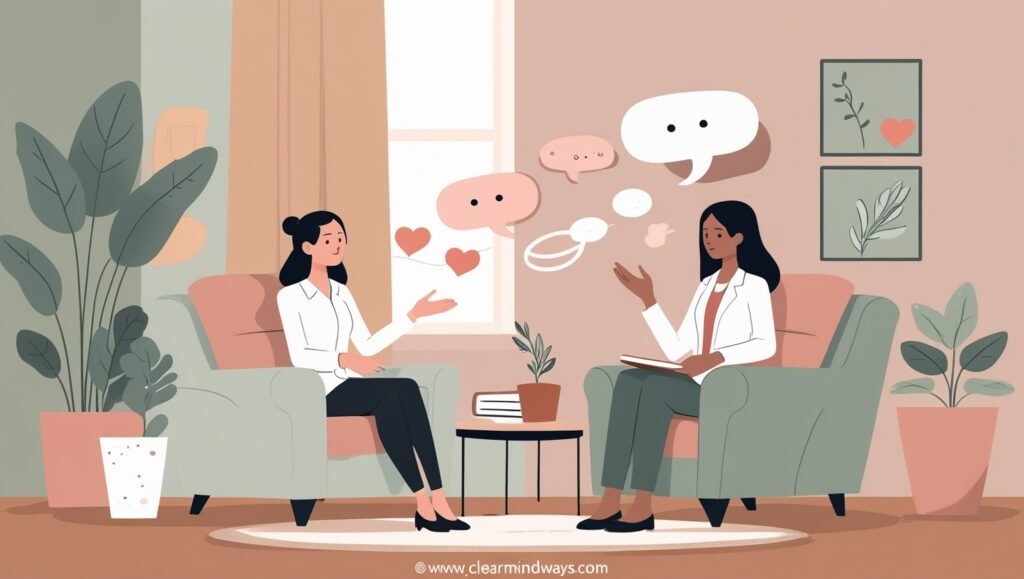
One of the best natural treatments for anxiety is talk therapy, aka psychotherapy, or counseling. Unlike medication, there are no foreign substances entering your body during therapy, so it is a truly natural treatment that operates by shifting thought patterns and behavior.
Key Types of Talk Therapy for Anxiety:
- Cognitive Behavioral Therapy (CBT) – The gold standard of anxiety treatment, with decades of research demonstrating its success. CBT helps you recognize and question self-defeating patterns of thinking that exacerbate anxiety, and contribute balanced, realistic thoughts.
- Acceptance and Commitment Therapy (ACT) – Teaches clients to accept the challenges of their emotional experiences, rather than struggling with them, including psychoeducation about psychological flexibility and coping skills drawn from mindfulness techniques.
- Exposure and Response Prevention (ERP) – Especially beneficial in case of specific phobias and OCD, it gradually exposes you to feared situations in a safe and supportive setting.
- Dialectical Behavior Therapy (DBT) – Uses CBT strategies with mindfulness and distress tolerance skills and is particularly helpful for individuals who have volatile emotions.
During therapy, you will learn these types of practical skills, which might be problem-solving skills, coping skills, or tools you can use in real life situations. Lots of folks upfront work with several different forms of therapy that dovetail well with their specific needs.
Talk therapy has benefits that go beyond symptom remission. Ongoing sessions offer a way to process emotions, access self-knowledge and cultivate resilience. Therapy is not a cover-up or a shortcut; it’s a tool to arm you with life-long coping mechanisms for dealing with stress and anxiety. Most individuals describe themselves as having increased confidence and a sense of being more capable after learning to cope with a problem-new or familiar-in therapy.
Getting the right therapist is huge. Search for licensed professionals who work specifically with anxiety disorders and use evidence-based treatments. Many therapists provide initial consultations to help you figure out if they’re a good match. Don’t be shy about “shopping around” for a therapist until you find someone with whom you feel comfortable, and who gets you.
2. Mindfulness Activities
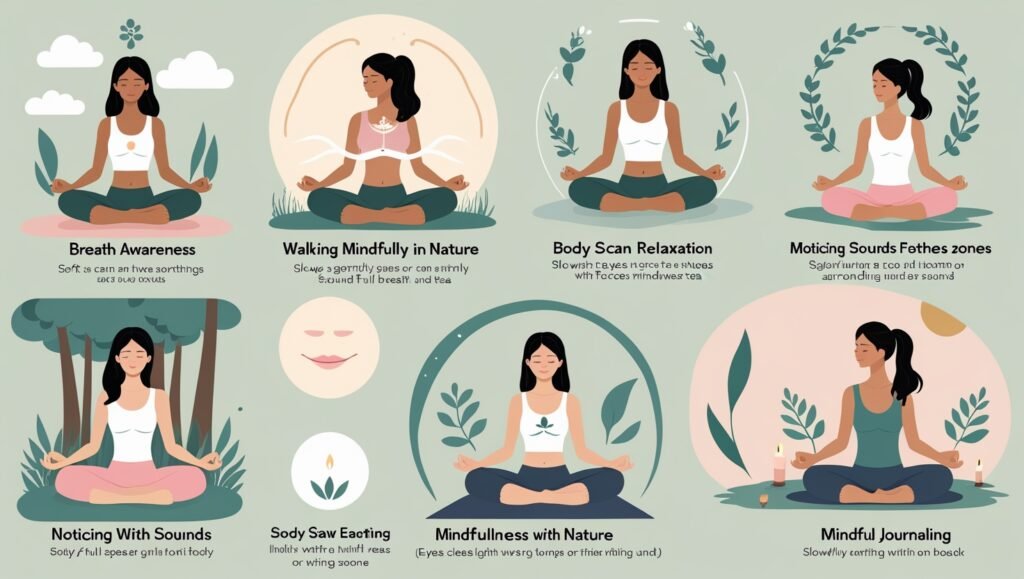
Mindfulness-based practices have received serious attention in the scientific community as effective strategies for managing anxiety. These are trained by getting your mind to focus on the present moment rather than worrying about the future or ruminating on the past. The more you practice mindfulness the more you literally change the structure of your brain, sharpening up the areas associated with emotional regulation and weakening the brain’s alarm system.
Popular Mindfulness Techniques for Anxiety:
Meditate – With only 5 to 10 minutes a day you can see improvement in anxiety. Begin with basic breathing exercises, concentrating on how the air fills and leaves your body.
Progressive Muscle Relaxation – Tense and relax individual muscle groups in your body one by one, making you more attuned to physical tension and how to let it go.
Body Scan Meditations – Gently take notice of each part of your body, acknowledging sensations while not attempting to alter them. This will help you start to become more mindful of how your anxiety is impacting you physically.
Mindful Acts – Turn everyday activities into acts of mindfulness by eating slowly and mindfully, walking mindfully or washing dishes while being fully present.
Breathing Exercises – Easy and effective, devices such as The 4-7-8 Technique, literally (On an inhale count to 4, hold the breathe/count to 7, exhale to a count of 8) can bring quick anxiety relief.
As you meditate (because your mind will wander), gently pull the line attached to your attention back in again and again without judgment.’” Non-judging awareness is a central aspect of effective mindfulness practice.
3. Exercise
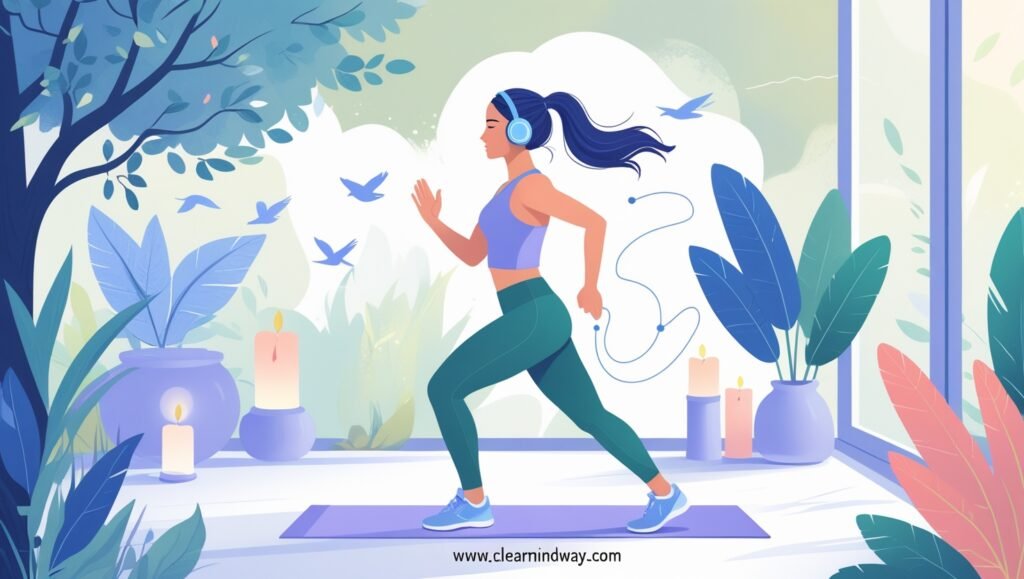
Exercise is one of the best ways to deal with anxiety because studies have shown it’s as powerful as many medications at treating mild to moderate anxiety for some people. Exercise acts through various mechanisms to lower anxiety, making it a robust addition to your mental health toolkit.
Your body releases endorphins when you work out, and endorphins have the power to lift your mood and help lessen stress (they’re known as “feel-good” chemicals for a reason, after all). Exercise also boosts production of a protein called brain-derived neurotrophic factor (BDNF), which strengthens brain health and may help to moderate anxiety. In addition, exercise offers a natural and healthy outlet for nervous energy and helps to relieve muscle tension – a side effect of anxiety.
Best Types of Exercise for Anxiety Relief:
(11)Physical Activity – Activities such as running, cycling, swimming, or dancing are capable of improving anxiety symptoms if done regularly. These efforts can be especially good for people, as they release endorphins and lower the stress-making hormone cortisol.
Weightlifting – Weightlifting can be meditative in the fact that it is a structured practice of lifting weights and we get positive feedback in the form of lifting heavier weights.
Yoga – It’s movement and mindfulness and breathing rolled into one, delivering tons of anti-anxiety bang for your buck. Studies show a significant reduction in symptoms of anxiety in those who practise regularly.
Tai Chi/Qigong -These slow graceful practices include a combination of mindful movement, meditation and controlled breathing which is great for those who want a lower impact activity.
Walking – Easy, and works, especially in nature. Even just a 10-minute walk a day can help stave off anxiety.
Dancing – Organised dancing classes (e.g. Zumba) or unstructured dancing (make some space in your living room and get moving), dancing is a form of creative aerobic exercise and can be social too.
4. Fish Oil

Fish oil supplements, which are rich in omega-3 fatty acids, could help fight anxiety, according to a new review published in the journal Prostaglandins, Leukotrienes and Essential Fatty Acids, which found the supplements may benefit those with anxiety. Omega-3 fatty acids – and specifically EPA (eicosapentaenoic acid) and DHA (docosahexaenoic acid) – are critical for brain function and have been found to help moderate mood and anxiety.
A number of studies have found that individuals with anxiety disorders tend to have lower levels of omega-3 fatty acids compared to people who do not have anxiety. Adding fish oil may make up for this deficiency and ease your anxiety. And omega-3s’ anti-inflammatory effects might also play a role in combating anxiety, since chronic inflammation is associated with mood disorders.
Studies of fish oil for anxiety are mixed, but mostly positive. Some studies have demonstrated dramatic reductions in anxiety symptoms in individuals who take omega-3 supplements, while others find little or no improvement in anxiety. The benefits seem especially potent in people who have a clinical anxiety disorder rather than temporary anxiety.
What to Look for in Fish Oil Supplements:
- Dosage – Look for products that provide at least 1000mg of combined EPA and DHA per day, with a higher ratio of EPA to DHA often recommended for mood benefits.
- Quality Testing – Choose reputable brands that test for purity and potency. Third-party testing for mercury and other contaminants is particularly important.
- Molecular Form – Triglyceride form fish oil is generally better absorbed than ethyl ester forms.
- Freshness – Check expiration dates and look for products with antioxidants like vitamin E to prevent rancidity.
Natural Food Sources of Omega-3s:
- Fatty Fish – Salmon, mackerel, sardines, and anchovies are excellent sources of EPA and DHA.
- Plant-Based Sources – Flaxseeds, chia seeds, and walnuts contain ALA, though conversion to EPA and DHA is limited.
- Algae-Based Supplements – A good option for vegetarians and vegans seeking direct EPA and DHA.
5. Chamomile

Chamomile has been a traditional herb for millennia, used in folk medicine to treat a wide range of conditions, including anxiety and insomnia, and emerging research has backed up some of its supposed uses. This mild herb has flavonoid compounds that can help reduce anxiety by influencing the activity of neurotransmitters in the brain. Called German chamomile (Matricaria chamomilla), it is the form typically consumed as tea or used for medicinal purposes.
Chamomile, according to clinical trials, might also significantly decrease symptoms of anxiety in sufferers of generalized anxiety disorder. In a well-known study, people who took chamomile extract for eight weeks saw significant decreases in anxiety compared to those who were given a placebo. The effects were especially strong among those who had moderate to serious levels of anxiety symptoms.
Different Forms of Chamomile and Their Uses:
- Chamomile Tea – This is the most mainstream and well known method you can use to get that calming ritual that boosts the anti-anxiety properties of the herb. Consume 2-3 cups of strong chamomile tea per day for a therapeutic effect.
- Chamomile Supplements – Provide concentrated doses and more reliable potency for those looking for stronger effects than tea.
- Essential Oil – With proper use (combining with carrier oils) can be used for aromatherapy, as massage oil, used for pet care, home cleaning, and scent.
- Bath Products – Chamomile bath salts or oils may help you relax – especially in the evening.
- Applying Chamomile - Chamomile creams or oils can be used for skin problems that could be causing nervousness or tension.
Safety Considerations:
- Allergies – People with allergies to members of the daisy family (ragweed, chrysanthemums, marigolds) should avoid chamomile.
- Interactions with Medications – Interfere with blood thinning medications, may also increase effects of sedating drugs.
- Pregnancy – Please consult your healthcare provider before using if pregnant or nursing.
6. Lavender
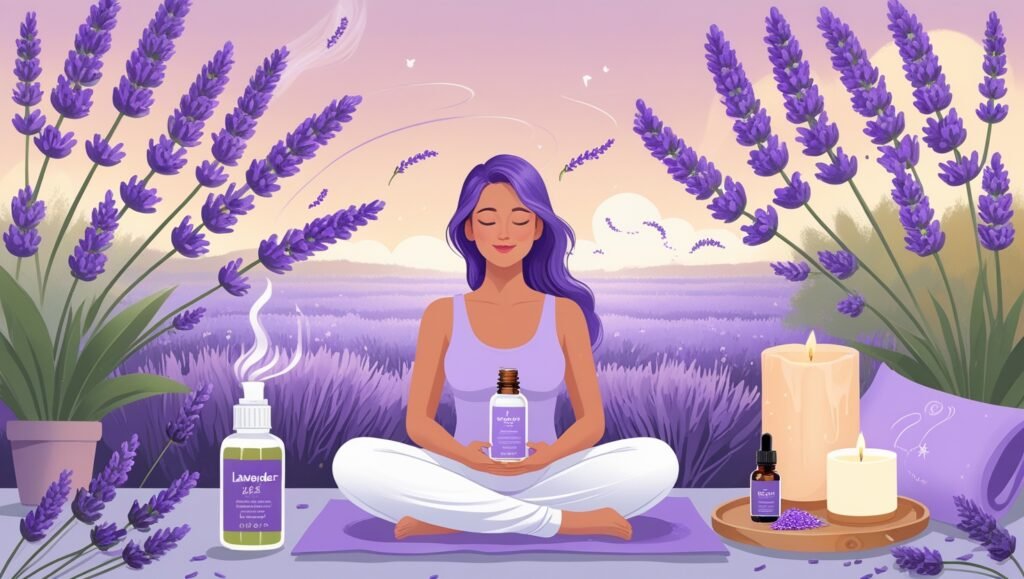
The calming reputation of lavender is believed to be well-earned, with abundant research supporting its relaxant effects. The purple flowering plant contains compounds such as linalool and linalyl acetate that seem to have anxiolytic (anxiety-reducing) effects. These compounds may act by influencing the same neurotransmitter systems targeted by prescription anxiety medications, only with more subtle effects.
There is some scientific evidence to support that lavender can help with different types of anxiety. Studies have shown that lavender oil can reduce anxiety before medical procedures, aid in better sleep of people suffering from anxiety disorders, as well as serve as a general anxiety relief when used consistently. Some research has indicated that lavender may be as effective as some prescription medications for relieving anxiety, but more studies are necessary to verify these results.
How to Use Lavender for Anxiety:
- Aromatherapy – Use lavender essential oil in a diffuser, add a few drops to a bath, or apply diluted oil to pulse points for quick relief.
- Oral Supplements – Standardized lavender oil extracts provide consistent doses of active compounds and may be more convenient than other forms.
- Lavender Tea – A gentler approach that combines the herb’s direct effects with the calming ritual of tea preparation and consumption.
- Topical Applications – Diluted lavender oil can be applied to temples, wrists, or behind ears for portable anxiety relief.
- Pillow Sachets – Dried lavender placed near your pillow can promote relaxation and better sleep quality.
- Bath Additions – Add dried lavender or essential oil to bath water for a full-body relaxation experience.
Choosing Quality Lavender Products:
- Species Matters – Look for products containing Lavandula angustifolia (English lavender), as this variety has the most research support.
- Purity Standards – Essential oils should be pure and undiluted, while supplements should be standardized to contain specific amounts of active compounds.
- Third-Party Testing – Choose products that have been tested for purity and potency by independent laboratories.
7. Lemon Balm

Lemon balm (Melissa officinalis) is a mint family member that for hundreds of years has been used to induce calmness and ease anxiety. This lemon-scented herb contains compounds known as terpenes, which might help calm the nervous system and lower stress hormones. Contemporary studies are now confirming various traditional uses of lemon balm, including reducing anxiety and stress.
Research on lemon balm for anxiety has produced positive results. Studies suggest lemon balm may lower cortisol levels (the main stress hormone) and help with stress-related mood changes. Certain studies have shown that lemon balm extract may help anxiety symptoms and cognition, especially in stressful situations.
Ways to Use Lemon Balm:
- Lemon Balm Tea – Use 1-2 teaspoons of dried lemon balm per cup of hot water, steeped for 10-15 minutes. Drink 2-3 cups daily for optimal benefits.
- Standardized Supplements – Offer concentrated doses and consistent potency. Look for extracts that specify the amount of active compounds.
- Tinctures – Liquid extracts that may be absorbed more quickly than capsules and allow for flexible dosing.
- Fresh Herb – Can be grown easily and used in teas, added to salads, or incorporated into cooking.
- Aromatherapy – Simply crushing fresh lemon balm leaves and inhaling the scent can provide immediate calming effects.
- Combination Products – Often combined with other calming herbs like chamomile or lavender for enhanced effects.
Benefits of Lemon Balm:
- Non-Sedating – Promotes relaxation without causing drowsiness, making it suitable for daytime use.
- Stress Hormone Reduction – Research shows it can reduce cortisol levels and improve mood in people experiencing chronic stress.
- Cognitive Support – Some studies suggest it may improve cognitive function, particularly in stressful situations.
- Gentle Action – Generally very safe with few reported side effects.
8. Avoiding or Limiting Alcohol
While it might seem counterintuitive to list “avoiding alcohol” as a natural remedy, reducing or eliminating alcohol consumption can be one of the most effective ways to naturally reduce anxiety. Many people use alcohol to cope with anxiety symptoms, but this strategy often backfires, creating a cycle that actually worsens anxiety over time.
How Alcohol Worsens Anxiety:
- Rebound Effect – As alcohol wears off, the brain reduces GABA activity and increases excitatory neurotransmitters, leading to increased anxiety that can last hours or days.
- Sleep Disruption – Alcohol interferes with deep sleep stages and REM sleep, leaving you less rested and more susceptible to anxiety.
- Treatment Interference – Reduces the effectiveness of therapy by impairing memory consolidation and emotional processing.
- Medication Interactions – Can interact dangerously with anxiety medications or reduce their effectiveness.
- Dependency Risk – Regular use for anxiety relief can lead to physical and psychological dependence.
Benefits of Reducing Alcohol:
- Better Sleep Quality – Improved sleep patterns within weeks of reducing alcohol intake.
- Mood Stability – Less emotional volatility and more consistent energy levels throughout the day.
- Enhanced Treatment – Better response to therapy and other anxiety treatments.
- Overall Health – Improved physical health supports better mental health and anxiety management.
9. Quitting Smoking
“It is also a removal strategy and has a profound effect on anxiety.” A lot of smokers think that cigarettes can help them calm down, but research shows it increases anxiety over the long term. Knowing this correlation could encourage individuals from quit smoking as they seek to control anxiety.
Nicotine sets up this loop in which you get temporary relief followed by more anxiety. When you smoke, nicotine rapidly enters your bloodstream and the brain, making you feel more relaxed and less stressed.
But when nicotine falls between cigarette puffs, the withdrawal symptoms you start to see are anxiety, irritability, and agitation. It results in a pattern in which cigarettes appear to help with anxiety, but only because they are relieving withdrawal symptoms from the last cigarette.
What About CBD?
CBD has surged to popularity as a natural anxiety remedy, with anecdotal reports innumerable of calming effects. But the scientific literature on the efficacy of CBD for anxiety is still not extensive or consistent enough to recommend it as a first-line treatment, and patients with anxiety should approach this new trend with caution.
The science on CBD and anxiety is still in its infancy. There has been some evidence that small studies are promising, particularly for social anxiety and for post traumatic stress disorder, but they have generally had poor methodology (limited sample sizes, short duration and absence of proper control groups). Most of the evidence for CBD as a treatment for anxiety has come from animal studies and laboratory experiments, which suggest that it has anti-anxiety effects, but for which there may not be enough data to draw firm conclusions about the effects in humans.
Regulation is one of the biggest problems of CBD in the supplement market. Quality, strength and purity of CBD products can be quite variable. Many products do not contain the levels of CBD they purport to have, and some products may even include unwanted ingredients or levels of THC (the psychoactive compound in cannabis) high enough to induce psychotropic effects. This heterogeneity complicates the prediction of effects or the choice of a dose.
And the legal status of CBD introduces another layer of complication. Even thc-free hemp-derived CBD (containing less than 0.3% THC) is technically federally illegal, but some states are developing their own rules, and new regulations are on the horizon. And CBD can also have negative interactions with other medications, especially medication metabolized by the liver, among them statins and blood thinners.
Affordability is another concern, since high-quality CBD products tend to be expensive — at least more expensive than other well-established natural remedies with more research backing them. Lots of people find the price of effective CBD dosing to be beyond what they want to spend on anxiety management, especially if they have other passage to cheap-but-effective anxiety management strategies.
If you are thinking about using CBD to help manage your anxiety, it’s essential to speak to your doctor about your interest, especially if you currently take medication. Begin with products that come from established companies that provide third-party testing results, and start at a low dose to see how you will respond. Remember, though, that CBD isn’t a cure-all for anxiety, and it works best as part of a holistic solution — meaning it should be utilized as a complementary therapy to other evidence-based approaches, such as therapy, exercise and stress management.
What About Valerian?
Valerian root has been used for anxiety and sleep problems since the times of the ancient Greeks and Romans, but modern research into its effectiveness has been mixed. Though some studies have shown that valerian can help with anxiety, the evidence isn’t as strong as it is for some other natural options, and the herb has some caveats.
History“Valerian has traditionally been used for over 2,000 years since the time of the ancient greeks where it was used as a mild nervine and to treat a variety of sleep induced disorders”[7]. With such a long history of use, many assume that valerian must be both safe and effective, although traditional use is not always a sign of modern day safety or effectiveness.
Research of valerian for anxiety yield inconsistent results. Some studies have found that valerian can reduce anxiety symptoms, especially when paired with other calming herbs such as lemon balm or passionflower. Yet numerous studies have been small or poorly designed, so firm conclusions about whether valerian helps are hard to make.
One of the primary issues with valerian is that it may cause side effects and interact with other drugs. Valerian may make some people feel drowsy, dizzy, sick in the stomach or have a headache. More problematically, valerian can interact with other sedative drugs, alcohol, and drugs that impact the central nervous system, leading to an excess of sedation.
Not to mention that the smell and taste of valerian can be very unpalatable for many people. Valerian root has an extremely noticeable, foul scent that others may liken to dirty socks, or stinky feet. The strong odor of valerian can be off-putting in valerian tea or tinctures, which may cause some people to stop using it prior to reaping the possible benefits.
Valerian merchandise also suffer from problems regarding quality and standardization. As with most herbal remedies, valerian products differ greatly in potency and purity. It is not known what exactly in valerian causes a sedative effect, so it is difficult to standardize products and find an ideal dosage.
Because of these disappointing findings, valerian is usually not recommended as an initial natural option for anxiety. If you do want to experiment with valerian, I’d recommend starting with small doses to gauge your tolerance, steering clear of alcohol and other sedating drugs during valerian use and stopping if you get any unwelcome effects. There are probably better natural possibilities to look at first.
FAQs
How long do natural anxiety remedies take to work?
- Immediate – Breathing exercises, aromatherapy (minutes)
- Short-term – Exercise benefits (20-30 minutes)
- Medium-term – Therapy, mindfulness (2-4 weeks)
- Long-term – Herbal supplements (4-8 weeks)
Can I combine multiple natural remedies?
Yes, combining remedies often works better than single approaches. Exercise + mindfulness + herbal tea can address anxiety from multiple angles. Be cautious mixing herbal supplements – consult a healthcare provider first.
Are natural remedies safe for everyone?
Generally safer than medications, but not risk-free. Pregnant women, children, elderly, and people with chronic conditions should consult healthcare providers before trying natural remedies.
When should I see a professional?
Seek help if anxiety:
- Interferes with daily life, work, or relationships
- Includes panic attacks or persistent worry
- Involves thoughts of self-harm
- Doesn’t improve after 6-8 weeks of natural approaches
How do I know if a remedy is working?
Track symptoms using a 1-10 scale or mood app. Look for:
- Better sleep quality
- Fewer anxious thoughts
- Improved stress coping
- Better overall mood
